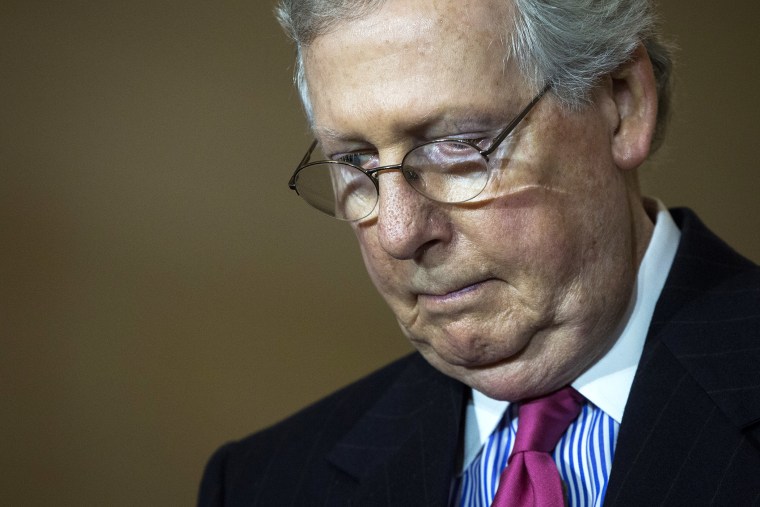Consider policymaking in a republic at its most basic level. Voters elect policymakers who identify problems and then try to come up with solutions to those problems.
To be sure, this is rarely easy. Sometimes officials misidentify problems, come up with misguided remedies, or struggle to reach a necessary consensus on solutions, but the underlying governing model is straightforward and sound.
In the case of Republican policymakers working on a health care overhaul, this model is being ignored.
When Democrats were crafting the Affordable Care Act, there was no question as to why they were acting. Democrats identified some key systemic problems -- too many Americans lacked basic health coverage, and even those with insurance faced security risks -- and then worked on a solution. There's ample room for debate about the merits of the Democrats' reform law, but there's no confusion about the purpose of their work.
With Republicans this year, no one has the foggiest idea what they're doing -- GOP leaders are operating in complete secrecy -- but just as importantly, we don't know what question they're trying to answer. The solution is being kept hidden, but so too is the purpose of the endeavor.
Vox published a great report on this today after speaking to eight Senate Republicans, each of whom struggled to explain what their party is even trying to do.
With the bill's text still not released for public view, Vox asked GOP senators to explain their hopes for it. Who will benefit from the legislation? What problems is this bill trying to solve?"All of them," Sen. John McCain said in an interview, not an uncharacteristic response of his Republican Senate colleagues.Over the course of the past week, Vox asked eight different Republican senators to explain the affirmative case for the bill. They rarely answered directly, at least not on the bill's policy merits.
In any policy debate, we're accustomed to asking whether the proposed solution is worthwhile. In this case, however, not only is the answer elusive, but the question is still murky.
A key part of the health care debate, obviously, is evaluating the substance of plans, scrutinizing expected outcomes and policy consequences. Who will benefit and who won't? Will the system be stronger or weaker? Related answers about coverage rates and costs go a long way in telling us whether a proposal is worth pursuing.
But this is a separate question altogether. Vox asked these eight GOP senators to articulate the point of their health care push, and they were generally lost as to how to answer.
Part of what's driving this dynamic is Republican leaders' total indifference to the substance of their own party's plan. Both Donald Trump and Mitch McConnell have made it clear that they're eager to pass a health care bill, but they're not especially interested in its contents.
This post-policy attitude, however, has taken root and spread throughout the party, to the point that Republicans can't explain in any detail the purpose of their own initiative.
I'm reminded anew of something Ezra Klein wrote in March, soon after the House GOP's bill was unveiled: "'In general,' writes Peter Suderman, 'it's not clear what problems this particular bill would actually solve.' This is a profound point. It is difficult to say what question, or set of questions, would lead to this bill as an answer. Were voters clamoring for a bill that cut taxes on the rich, raised premiums on the old, and cut subsidies for the poor? Will Americans be happy when 15 million people lose their health insurance and many of those remaining face higher deductibles? ... [T]he biggest problem this bill has is that it's not clear why it exists. What does it make better? What is it even trying to achieve?"
Three months later, we don't know -- and neither do the Republicans working on the legislation.
